Related Research Articles

A fanzine is a non-professional and non-official publication produced by enthusiasts of a particular cultural phenomenon for the pleasure of others who share their interest. The term was coined in an October 1940 science fiction fanzine by Russ Chauvenet and first popularized within science fiction fandom, and from there the term was adopted by other communities.

James White was a Northern Irish author of science fiction novellas, short stories and novels. He was born in Belfast and returned there after spending some early years in Canada. After a few years working in the clothing industry, he worked at Short Brothers Ltd., an aircraft company based in Belfast, from 1965 until taking early retirement in 1984 as a result of diabetes. White married Margaret Sarah Martin, another science fiction fan, in 1955 and the couple had three children. He died of a stroke.
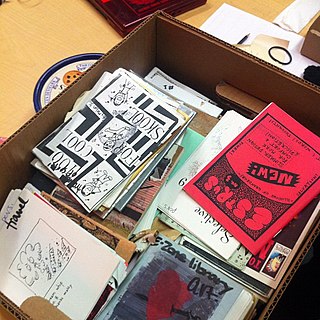
A zine is a small-circulation self-published work of original or appropriated texts and images, usually reproduced via a copy machine. Zines are the product of either a single person or of a very small group, and are popularly photocopied into physical prints for circulation. A fanzine is a non-professional and non-official publication produced by enthusiasts of a particular cultural phenomenon for the pleasure of others who share their interest. The term was coined in an October 1940 science fiction fanzine by Russ Chauvenet and popularized within science fiction fandom, entering the Oxford English Dictionary in 1949.

A science-fiction fanzine is an amateur or semi-professional magazine published by members of science-fiction fandom, from the 1930s to the present day. They were one of the earliest forms of fanzine, within one of which the term "fanzine" was coined, and at one time constituted the primary type of science-fictional fannish activity ("fanac").

Robert Shaw was a science fiction writer and fan from Northern Ireland, noted for his originality and wit. He won the Hugo Award for Best Fan Writer in 1979 and 1980. His short story "Light of Other Days" was a Hugo Award nominee in 1967, as was his novel The Ragged Astronauts in 1987.

Tom Reamy was an American science fiction and fantasy author and a key figure in 1960s and 1970s science fiction fandom. He died at age 42 prior to the publication of his first novel; his work is primarily dark fantasy.
Mike Glyer is both the editor and publisher of the long-running science fiction fan newszine File 770. He has won the Hugo Award 12 times in two categories: File 770 won the Best Fanzine Hugo in 1984, 1985, 1989, 2000, 2001, 2008, 2016 and 2018. Glyer won the Best Fan Writer Hugo in 1984, 1986, 1988, and 2016. The 1982 World Science Fiction Convention (Worldcon) committee presented Glyer a special award in 1982 for "Keeping the Fan in Fanzine Publishing."
File 770 is a long-running science fiction fanzine, newszine, and blog site published and administered by Mike Glyer. It has been published every year since 1978, and has won a record eight Hugo Awards for Best Fanzine, with the first win in 1984 and the latest in 2018.
Walter Alexander Willis (1919–1999) was a well-known Irish science fiction fan, resident in Belfast.
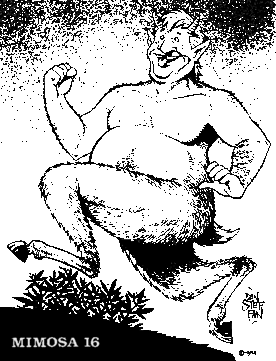
Mimosa was a science fiction fanzine edited by Richard Lynch and Nicki Lynch. It won six Hugo Awards for Best Fanzine and was nominated a total of 14 times (1991-2004). The headquarters was in Gaithersburg, Maryland.

Emerald City was a science fiction fanzine published in print and on the internet by Cheryl Morgan. She had assistance from Kevin Standlee and Anne Murphy. The magazine published 134 regular issues and 6 special issues between September 1995 and October/November 2006. Emerald City received several Hugo Award nominations during its run, winning once in 2004 in the Best Fanzine category.
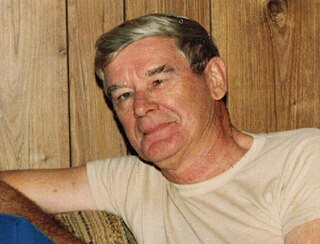
Arthur Wilson "Bob" Tucker was an American author who became well known as a writer of mystery, action adventure, and science fiction under the name Wilson Tucker.
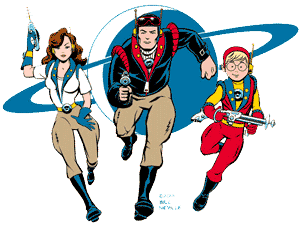
The 62nd World Science Fiction Convention (Worldcon), also known as Noreascon 4, was held on 2–6 September 2004 at the Hynes Convention Center, Sheraton Boston Hotel and Boston Marriott Copley Place in Boston, Massachusetts, United States.
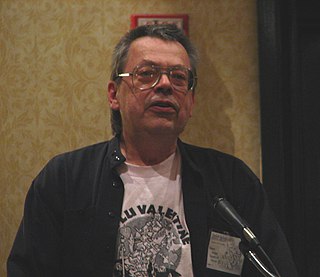
Stephen Willis Stiles was an American cartoonist and writer, coming out of the science fiction fanzine tradition. He won the 2016 Hugo Award for Best Fan Artist.
The 12th World Science Fiction Convention (Worldcon), also known as SFCon, was held on 3–6 September 1954 at the Sir Francis Drake Hotel in San Francisco, California, United States.
The 52nd World Science Fiction Convention (Worldcon), also known as ConAdian, was held on 1–5 September 1994 at the Crowne Plaza, Place Louis Riel, and Sheraton hotels, and the Winnipeg Convention Centre in Winnipeg, Manitoba, Canada.
Arthur Thomson (1927–1990) was a British artist and writer, a highly regarded member of British science fiction fandom from the 1950s onwards, both as a fanzine writer/editor and prolific artist. Resident illustrator for the influential fanzine Hyphen, he won the TransAtlantic Fan Fund in 1964 and visited the United States. Thomson was nominated five times for the Hugo Award for Best Fan Artist, but never won.

Earl Kemp was an American publisher, science fiction editor, critic, and fan who won a Hugo Award for Best Fanzine in 1961 for Who Killed Science Fiction, a collection of questions and answers with top writers in the field. Kemp also helped found Advent:Publishers, a small publishing house focused on science fiction criticism, history, and bibliography, and served as chairman of the 20th World Science Fiction Convention. During the 1960s and '70s, Kemp was also involved in publishing a number of erotic paperbacks, including an illustrated edition of the Presidential Report of the Commission on Obscenity and Pornography. This publication led to Kemp being sentenced to one year in prison for "conspiracy to mail obscene material," but he served only the federal minimum of three months and one day.
The Enchanted Duplicator is science fiction fan fiction written by Walt Willis and Bob Shaw. It was originally published in February 1954, in an edition of 200 numbered copies, and has been reprinted many times, notably in an edition illustrated by Eddie Jones in 1962; in Amazing Stories in 1972/3; and in Warhoon 28, a hardcover fanzine collection of Willis's writing, in 1980.
Myrtle Rebecca Smith Gray Nolan, known to science fiction history as Morojo or sometimes Myrtle R Douglas, was a science fiction fan, fanzine publisher, and cosplay pioneer from Los Angeles.
References
- ↑ "The Long List of Hugo Awards". Archived from the original on 7 September 2012. Retrieved 26 November 2008.
- ↑ Tymn, Marshall B., ed. The Science Fiction Reference Book: A Comprehensive Handbook and Guide to the History, Literature, Scholarship, and Related Activities of the Science Fiction and Fantasy Fields Starmont: 1981; pp. 106-08.
- ↑ Nicholls, Peter. The Encyclopedia of Science Fiction Doubleday: 1979; p. 302
- ↑ "Mimosa 16, pages 21-24. "I Remember Me" by Walt Willis". jophan.org.